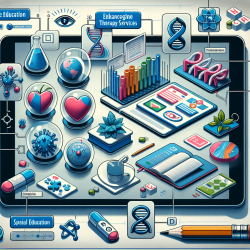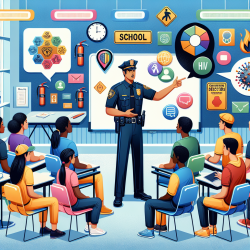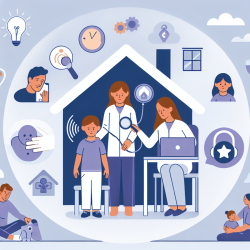Introduction
The COVID-19 pandemic brought about unprecedented challenges in education, particularly affecting students' socio-emotional skills and learning outcomes. The research article "Neglecting students’ socio-emotional skills magnified learning losses during the pandemic" highlights the critical role these skills play in mitigating learning losses. This blog aims to guide practitioners in enhancing their skills to address these challenges, drawing from the research findings.
The Importance of Socio-Emotional Skills
Socio-emotional skills such as self-regulation, motivation, and grit are crucial for students' academic success. During the pandemic, the lack of face-to-face interactions and structured learning environments exacerbated learning losses, particularly in socio-economically disadvantaged areas. The study conducted in Goiás, Brazil, demonstrated that behavioral nudges targeting these skills significantly reduced learning losses in math and Portuguese.
Implementing Behavioral Nudges
The study utilized a cluster-randomized control trial to send behavioral nudges via text messages to high-school students and their caregivers. These nudges aimed to enhance socio-emotional skills by encouraging engagement with school activities, supporting emotion regulation, fostering a growth mindset, and developing grit. The results showed a 24% reduction in Portuguese learning losses and a 7.5% reduction in math, highlighting the effectiveness of this approach.
Practical Applications for Practitioners
Practitioners can implement similar interventions by:
- Utilizing simple technologies like text messages to reach students and caregivers.
- Focusing on enhancing socio-emotional skills through regular communication.
- Incorporating themes of motivation, self-regulation, and growth mindset in their messaging.
- Monitoring and adapting interventions based on student feedback and engagement levels.
These strategies can be particularly effective in remote or hybrid learning environments, where traditional face-to-face support is limited.
Encouraging Further Research
While the study provides valuable insights, further research is needed to explore the long-term impacts of socio-emotional interventions on learning outcomes. Practitioners are encouraged to collaborate with researchers to evaluate the effectiveness of different approaches and to adapt interventions to diverse educational settings.
Conclusion
Incorporating socio-emotional skill development into educational practices is essential for mitigating learning losses and promoting student success. By leveraging data-driven strategies and behavioral nudges, practitioners can create supportive learning environments that foster resilience and academic achievement.
To read the original research paper, please follow this link: Neglecting students’ socio-emotional skills magnified learning losses during the pandemic.










